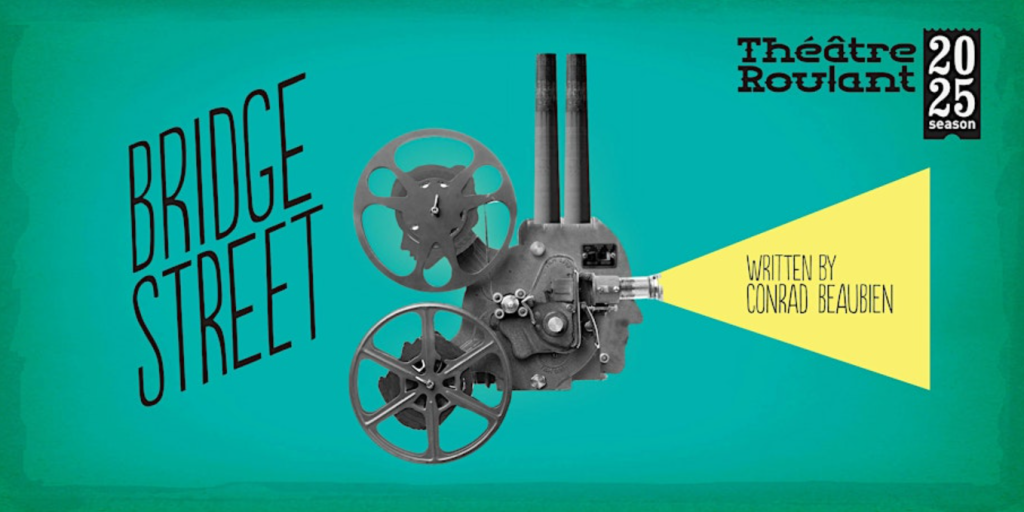‘Bridge Street’ is Perplexing Yet Powerful

Jake MacNeil (Pat Larkin) has long been in charge of the A.G. MacNeil woolen mill, but now is in the early stages of dementia. As Jake’s mind fades, so does his company, leaving his children Judith (Liz Simpson) and Ned (David Baker) to grapple with how to salvage their father’s life’s work. With an offshore company offering to buy the business, the future of the mill as well as the relationships of the family who runs it are completely up in the air.
Théâtre Roulant closes out their 2025 Théâtre at the Roundabout season with Bridge Street, written by Creative Director Conrad Beaubien and directed by Artistic Director John Burns (the company’s founders). The horse-drawn company’s summer season has a permanent home on the front lawn of the Waring House. I attended their opening show this season and so it only felt fitting to return for the end, however the performance I was set to see on Tuesday August 19 had to be cancelled due to rain (this detail will become important later) so I attended the show the following evening instead.
The stage is dressed with a walker and assorted black boxes of varying shapes and sizes. On top of a box centre stage is a large white projector, and a box downstage left carries an antique projector with some stacked film cans sitting next to it. To begin the show, the caravan doors opened, extending the playing area and revealing a large white projector screen as well as some more film cans and white cardboard storage boxes scattered messily on the floor.
The founders took to the stage for some brief remarks with Beaubien discussing that his background was in film, so this production would be largely multimedia. In addition to the live performances, the white projector would display antique footage projected onstage, for which Megan Hutton had composed original music. Unfortunately as the show was about to begin it was revealed there were some technical issues with the projector; apparently the rain the previous night had reached some of the stored equipment and so the performance would have to be without the projected visuals.
This is the second time Théâtre Roulant’s co-founders have tackled this very script, having first presented it in 2016. Within moments of the show beginning it is entirely clear why they felt the need to return to this story. Beaubien’s writing is mostly fragmented; it feels almost as though we are witnessing the piece from the perspective of Jake’s gradually fading mind. Every word spoken by the characters onstage feels somehow foreign despite being in English. Each character’s dialogue has an entirely different and complicated lexicon; Ned speaks primarily in aggressively modern jargon, where Judith is a bit more rural and crass with a constant aggressive edge. Both Baker and Simpson have a clear understanding of their characters’ intentions, providing a strong sense of tone throughout the show so the audience can sense the stakes and tensions where the particulars may still remain unclear.
Meanwhile, amidst the fractured dialogue there are bursts of beauty and poetry. These moments are usually reserved for Jake, who despite never being aware of his current surroundings or what year it is, manages brief moments of clarity or coincidental relevance to his company’s situation. One moment that stands out as especially powerful features Jake giving a monologue describing circumstances eerily reminiscent of his current living situation as something he hopes never to happen to him. Larkin’s delivery is haunting, as once the description is done he pauses and gazes into the audience with a deep melancholic expression – almost as if there is a moment of realization – before fading away and asking sweetly, “Is it my birthday?”
The script’s complicated form of dialogue has potential but also comes with its share of issues: the entirety of the play feeling somewhat vague and unsure leaves the audience in the dark, constantly trying to navigate the murky structure. Perhaps this would have been alleviated by the projections, however there is nonetheless an intrigue to how the audience’s uncertainty mirrors Jake’s own. One thing this show has perfected is the dark and absurd humour that can be found in the early stages of dementia. Beaubien’s text does not shy away from using Jake’s condition as a source of levity, and Burns’ direction keeps these moments of dismal absurdity light enough to welcome laughter.
In Bridge Street, Théâtre Roulant has woven a complex tapestry exploring how family and professional dynamics are affected while coping with a loved one’s dementia. The content is difficult not only in its subject matter, but also in its delivery; there is something powerful in the unique structure which merits the company’s return to the text. It treads a delicate balance between unfortunate realities and strange moments where one can’t help but laugh.
‘Bridge Street’ is produced by Théâtre Roulant and runs at The Waring House until August 23, 2025. Tickets and more information can be found here.
